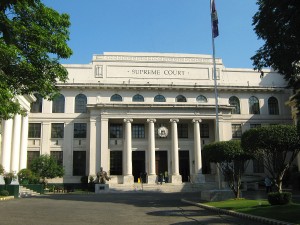Headline
SC to Comelec: Stop “No Bio, No Boto” rule

The Supreme Court of the Philippines building in Manila, Philippines. Photo by Mike Gonzalez / Wikimedia Commons.
MANILA, PHILIPPINES – The Supreme Court (SC) stopped the Commission on Elections’ “No Bio, No Boto” rule requiring voters to have their biometrics taken before allowing them to vote in the May 2016 elections.
In a report by Edu Punay of The Philippine Star, SC spokesperson Theodore Te said the justices of the high court in full session issued a temporary restraining order (TRO) enjoining the poll body from implementing the new policy, which deactivates registered voters without digital photos, fingerprints and signature in their registration records.
Being led by Kabataan party-list Rep. Terry Ridon, several groups filed a petition last which the SC acted on.
The SC ordered the Comelec and the Office of the Solicitor General to answer the petition and submit their comment within 10 days.
The high tribunal should grant the petition of allowing over three million voters who have no biometrics to vote in next year’s polls.
The petitioners asked the SC to make the Comelec’s resolution issued for the implementation of the No Bio, No Boto policy non valid, as well as the Republic Act 10367 or law that mandates biometrics voter registration.
They argued that the policy of Comelec violates the 1987 Constitution of exercising every Filipino’s right to vote.
The petitioners said the policy ““violates due process as it is a deprivation of the constitutional right to vote for millions of Filipinos who have failed to register their biometric information despite existing registration.”
They further argued that over three million voters will lose their right to vote due to the new biometrics requirement.
Records from Comelec shows that a total of 3,059,601 registered voters have no biometrics or 5.86 percent of the 52,239,488 total registered voters for the 2016 elections.
The petition was also joined by leaders of the National Union of Students of the Philippines, Anakbayan, College Editors Guild of the Philippines, League of Filipino Students and two voters facing disenfranchisement due to the new policy.





















